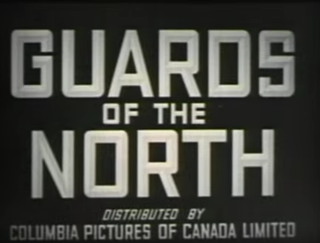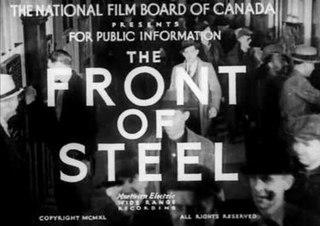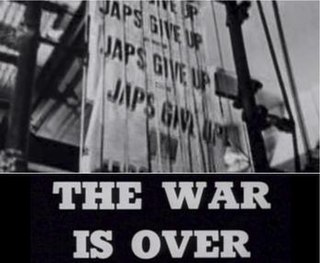
Wings of a Continent is a 1941 Canadian short documentary film, part of the Canada Carries On series of short films by the National Film Board of Canada, produced for the Office of Public Information. The film was directed by Raymond Spottiswoode—father of filmmaker Roger Spottiswoode—and produced by Stuart Legg and narrated by Lorne Greene.

Everywhere in the World is a 16-minute 1941 Canadian documentary film about the contributions of the United States and Commonwealth countries to the Allied war effort, made by the National Film Board of Canada (NFB) as part of the wartime Canada Carries On series. The film was produced by Stuart Legg. The film's French version title was Partout au monde.

The Home Front is a 10-minute 1940 Canadian documentary film, made by the National Film Board of Canada (NFB) as part of the wartime Canada Carries On series. The film was produced and directed by Stanley Hawes.

Guards of the North is a 10-minute 1941 Canadian documentary film, made by the National Film Board of Canada (NFB) as part of the wartime Canada Carries On series. The film, directed by Raymond Spottiswoode, documented the defences of Iceland during the Second World War. The film's French version title is Avant-garde du Nord.

The Battle of Brains is a 13-minute 1941 Canadian documentary film, made by the National Film Board of Canada (NFB) as part of the wartime Canada Carries On series. The film, directed by Stanley Hawes and produced by Stuart Legg, contrasted modern warfare with the First World War. The film's French version title is Sur le front scientifique.

Inside Fighting Canada is an 11-minute 1942 Canadian documentary film, made by the National Film Board of Canada (NFB) as part of the wartime Canada Carries On series. The film, directed by Jane Marsh and produced by James Beveridge, was an account of the Canadian military during the Second World War. The film's French version title is Canada en guerre.

The Front of Steel is an 11-minute 1940 Canadian documentary film, made by the National Film Board of Canada (NFB) as part of the wartime Canada Carries On series. The film, directed by John McDougall and produced by Stuart Legg, is an account of the value of steel in war production in Canada during the Second World War.

The War Is Over is a 1945 five-minute Canadian short newsreel produced by the National Film Board of Canada (NFB). The War Is Over documents the end of the Second World War. The French version of the film is titled La guerre est finie.

Heroes of the Atlantic is a 1941 15-minute Canadian short documentary film, part of the Canada Carries On series of wartime films by the National Film Board of Canada (NFB), produced for the Office of Public Information. The film documented the work of the Royal Canadian Navy and the Merchant Marine during the Battle of the Atlantic in the Second World War. Heroes of the Atlantic was directed by J.D. Davidson and produced by Stanley Hawes.

The Gates of Italy is a 21-minute 1943 Canadian documentary film, made by the National Film Board of Canada as part of both the wartime Canada Carries On and The World in Action series. The film was produced by Stuart Legg and Tom Daly. The Gates of Italy describes the last days of Benito Mussolini's rule over Italy in 1943 during the Second World War.

Back to Jobs is a nine-minute 1945 Canadian documentary film, made by the National Film Board of Canada (NFB) as part of the postwar Canada Carries On series. The film describes soldiers in the Second World War returning home and back to a civilian life. The French version title of Back to Jobs is Nos soldats reviennent .

The Voice of Action is a 16-minute 1942 Canadian documentary film, directed by James Beveridge and produced by Raymond Spottiswoode. The short film was made by the National Film Board of Canada (NFB) as part of the wartime Canada Carries On series. The Voice of Action describes the importance of the Canadian Broadcasting Corporation (CBC) in the Second World War. The French version title of The Voice of Action is Dynamisme des ondes.

The Children from Overseas is a 10-minute 1940 Canadian documentary film, made by the National Film Board of Canada (NFB) as part of its Canada Carries On series.

The War for Men's Minds is a 21-minute 1943 Canadian documentary film, made by the National Film Board of Canada (NFB) as part of the wartime The World in Action series. The film was produced by Stuart Legg. The film describes the impact of propaganda from the Axis powers in 1943, during the Second World War. The French version title is À la conquête de l'esprit humain.

Food - Weapon of Conquest is a 22-minute 1941 Canadian documentary film, made by the National Film Board of Canada (NFB) as part of the wartime Canada Carries On series. The film was directed and produced by Stuart Legg. Food - Weapon of Conquest shows the food shortage in Nazi-occupied countries in the Second World War, contrasted with the Allied response to the global food crisis. The film's French version title is Une armée marche sur son estomac.

Pincer on Axis Europe is a 20-minute 1943 Canadian documentary film, made by the National Film Board of Canada as part of the wartime Canada Carries On series. The film describes the Allied invasion of North Africa in 1942 during the Second World War.

Quebec – Path of Conquest is an 11-minute 1942 Canadian documentary film, made by the National Film Board of Canada as part of the wartime Canada Carries On series. The film was directed by Radford Crawley and produced by Raymond Spottiswoode. Quebec – Path of Conquest describes the importance of the province of Quebec to Canada and the Allied war effort during the Second World War. The film's French version title is Québec, tremplin stratégique.

Gateway to Asia is a 10-minute 1945 Canadian documentary film, directed and produced by Tom Daly for the National Film Board of Canada (NFB) as part of the wartime Canada Carries On series. The film documents the importance of British Columbia during the Second World War as a "gateway" to Asia and the Pacific. The French version of Gateway to Asia is Au seuil du Pacifique.

Zero Hour is a 22-minute 1944 Canadian documentary film, made by the National Film Board of Canada (NFB) as part of both the wartime Canada Carries On and The World in Action series. The film was produced by Stuart Legg. Zero Hour describes the Axis and Allied invasions that have taken place during the Second World War.

The Battle of the Harvests is an 18-minute 1942 Canadian documentary film, made by the National Film Board of Canada (NFB) as part of the wartime Canada Carries On series. The film was produced by James Beveridge and directed by Stanley Jackson, who also provided the narration. The Battle of the Harvests shows how the farmers were mobilized worldwide in a battle of harvests to serve the fighting nations during the Second World War. The film's French version title was La Bataille des récoltes.




















